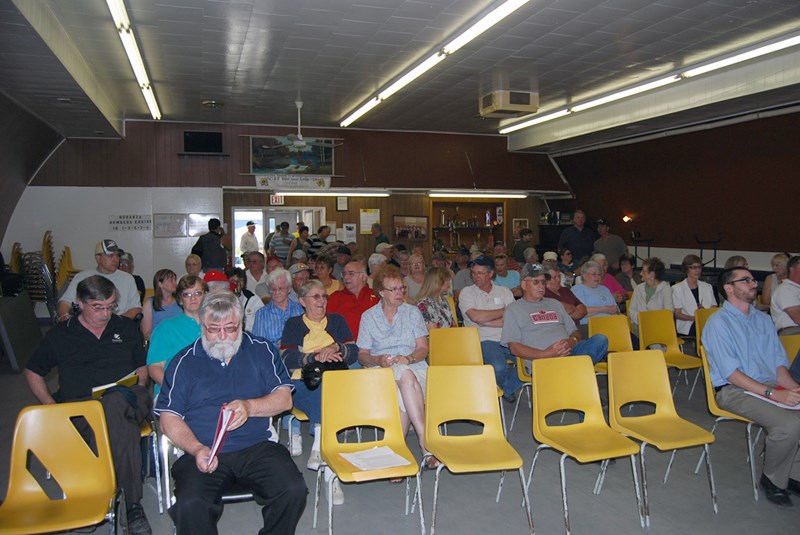Approximately 120 Snow Lake residents ttended a Motor Transport Board public hearing in the community's Elks' Hall on the morning of July 8. They were there to voice opposition to the discontinuation of Greyhound bus service to the town and area, or to support those who did.
After holding a similar hearing to a sparse group the day before in Flin Flon, the numbers in Snow Lake seemed to surprise many in attendance. After the large crowd was signed in and seated, the hearing got underway.
The board's secretary, Iris Murrell, introduced board chairperson Al Rivers, and members Rolly Lavalee, Tom Freeman, and Jacques Samyn. As well, appearing on behalf of Greyhound was Peter Hamel and Amalgamated Transit Union member Eric Carr. Rivers explained some ground rules prior to beginning the proceedings.
Snow Lake's Mayor Garry Zamzow set a sense of informality right from the outset by asking to address the session prior to it beginning, he gave the board an overview of the community and some background information meant to help in their deliberations.
Following the mayor, Hamel spoke to those assembled. He stated that Greyhound wasn't there to hurt the community; they were there to help. He explained that after losing $15 million in 2008 and $20 million thus far in 2009, Greyhound was looking for options on under- producing runs. He mentioned either sharing them, or handing them over entirely to another party. He noted that the loss of 16 per cent of their area ridership since 2005 was the major reason for the discontinuation. As well, Hamel said that Greyhound had witnessed a 31 per cent overall decline in ridership since the horrific incident where a passenger was beheaded on a Greyhound Bus outside Portage la Prairie by another passenger a year ago.
Carr then spoke, advising that his union is being asked to help their employer. As the union wants to keep key good paying union jobs, the company has to be kept alive and the serviced busses running. In his address, Carr noted that there was perhaps room for subsidization from the province or Ottawa for unprofitable transportation runs. This was a suggestion that came forward during several presentations in the day.
The first of many speakers then took the floor and offer the community's reasons for keeping area service intact, their hopes that it will not see further erosion, their complaints about current practices of the provider, and their compliments for the local operator were aired over the three non-stop hours that the hearing took place.
One of the people who was at the hearing and offered their insights was the Town of Snow Lake Chief Administrative Officer (CAO), Jeff Precourt: "I thought it was great that even though it was a hearing, it wasn't that formal," Precourt said of the proceedings. "It was quite jovial in nature and there was a lot of back and forth."
Precourt said that trying to shut down a bus service would be looked upon as controversial anywhere, but he noted the Greyhound people scored a few points in being very straight forward with what they wanted to do, as well as in discussing their financial situation. "They are in a dire situation, they really are," said Precourt. "And really, one of the things that I thought was unusual was that they invited their union representative to be there. I don't think that that was necessarily a benefit to Greyhound, but it gave you a much more balanced perception of where they are at."
Precourt said that the Transport Board was told by several presenters that Greyhound had a basic monopoly on the service and that although they had some routes that were not holding their own, there were others that were more lucrative, and that these should offset each other - taking the good with the bad. "As well others brought up the essential service part of Greyhound's business," said Precourt. "The provincially required and time sensitive (potable) water tests, samples sent out and received at the Health Centre, and passengers going to medical appointments."
Precourt noted that the hearing dealt only with the passenger side of Greyhounds business, and that it had no bearing on their freight services, where most of the local concern sits. "The fellow from Greyhound noted that everyone is concerned about losing the service, but no one is riding the bus," Precourt explained. "Greyhound says, sure there is freight going on the bus, but the hearing had nothing to do with freight. There was some talk of government subsidization and they seemed open to it, however one would think that it might be a tough sell."
The hearing also delved into the service side of things, where presenters stated that the buses servicing some of the carrier's routes are in poor condition. It was stated that there are multiple breakdowns and a number of people spoke of getting stranded in Thompson, Ponton, and Grand Rapids. The argument was brought forward that if their service was more reliable, perhaps more people would ride the bus. As well, there was controversy over how the Snow Lake ridership numbers are actually counted. "They were asked if their numbers reflected the number of people from Snow Lake who drive to Ponton and catch the bus," said Precourt. "The answer was no, they were not including these folks in their numbers, they included just Snow lake ticket sales." When people get on the bus in Ponton, those numbers are apparently included in the ticket sales out of Grand Rapids.
"From my perspective, I think the turnout was so good in Snow Lake that they will have no choice but to continue the service," said Precourt.
The board normally makes their decision in these matters in the two weeks following a hearing.




